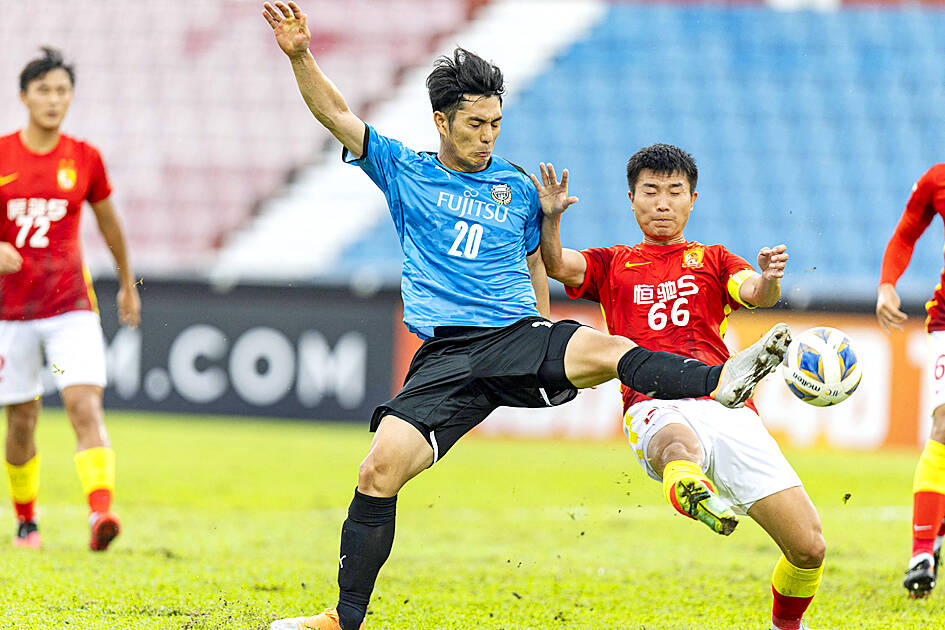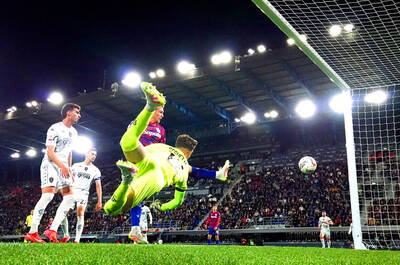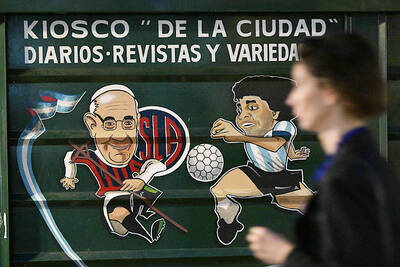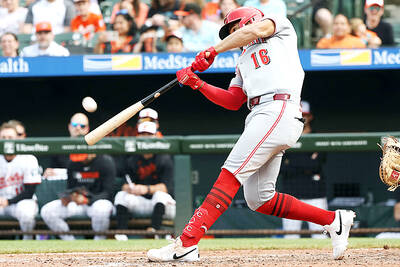Japan was a soccer backwater when the J.League started 30 years ago, but its success has helped the sport thrive in the country and turned the national team into FIFA World Cup regulars.
The J.League starts its new season tomorrow, and has come a long way since it launched in 1993 in a blaze of flashing lights, rock guitars and fireworks at Tokyo’s National Stadium.
The league’s inaugural season featured 10 teams, but there are now 60 from all over Japan playing in three divisions.

Photo: AFP
Clubs have become an important part of their local communities and J.League chairman Yoshikazu Nonomura said that “football culture has taken root in Japan.”
“When the league began, I think a lot of people thought of it as just flashy entertainment,” he said. “Now 30 years have passed, and I think we are getting close to the real J.League that we were aiming for.”
The J.League brought professional soccer to Japan and replaced the company teams of the old corporate league with clubs representing their local areas.
Big-name signings such as Zico and Gary Lineker helped boost the new league’s profile, while local players such as Kazuyoshi Miura became huge stars.
The improved standard helped Japan’s national team, who had never qualified for a World Cup at the time.
They made their debut appearance in France in 1998 and have never missed a World Cup since. They have also been crowned Asian champions a record four times.
Kengo Nakamura, who played at the 2010 World Cup, said the J.League has been “the foundation” for the national team’s improved fortunes.
“The J.League started and we became professional, and with that the awareness, motivation and quality of the players increased,” he said.
European clubs began taking an interest in Japanese players soon after the J.League began, with Miura and Hidetoshi Nakata signing for Italian clubs.
The flow of players moving overseas has increased over the years — only seven of Japan’s squad at last year’s World Cup in Qatar were with J.League clubs. The trend has helped Japan on the international stage, but left a void in the J.League.
“I personally want to see more J.League players in the national team, because that would get people excited about the J.League,” said Nakamura, who made almost 700 appearances for Kawasaki Frontale.
“If the national team play and then you say to people: ‘Ok, let’s watch the J.League now,’ they say, ‘Well, who can we watch?’” he said.
Frontale have won the J.League four times in the past six seasons, but have seen five Japan internationals, including Brighton & Hove Albion winger Kaoru Mitoma, leave over the past two years.
Nakamura said it is difficult to stop players moving to Europe, and believes the trend “might even accelerate” in the years to come.
The league still attracts a small number of well-known players, albeit usually past their prime.
Defender Tomoaki Makino, who played with Andres Iniesta at Kobe last season before retiring, said that the league needs those big names because it raises the overall quality.
“It also puts a good kind of pressure on the whole club, for example with medical facilities, publicity and recruitment,” he said.

Bologna on Thursday advanced past Empoli to reach their first Coppa Italia final in more than half a century. Thijs Dallinga’s 87th-minute header earned Bologna a 2-1 win and his side advanced 5-1 on aggregate. Giovanni Fabbian opened the scoring for Bologna with a header seven minutes in. Then Viktor Kovalenko equalized for Empoli in the 30th minute by turning in a rebound to finish off a counterattack. Bologna won the first leg 3-0. In the May 14 final in Rome, Bologna are to face AC Milan, who eliminated city rivals Inter 4-1 on aggregate following a 3-0 win on Wednesday. Bologna last reached the

If the Wild finally break through and win their first playoff series in a decade, Minnesota’s top line likely will be the reason. They were all over the Golden Knights through the first two games of their NHL Western Conference quarter-finals series, which was 1-1 going back to Minnesota for Game 3 today. The Wild tied the series with a 5-2 win on Tuesday. Matt Boldy had three goals and an assist in the first two games, while Kirill Kaprizov produced two goals and three assists. Joel Eriksson Ek, who centers the line, has yet to get on the scoresheet. “I think the biggest

From a commemorative jersey to a stadium in his name, Argentine soccer organizers are planning a slew of tributes to their late “Captain” Pope Francis, eulogized as the ultimate team player. Tributes to the Argentine pontiff, a lifelong lover of the game, who died on Monday at the age of 88, have been peppered with soccer metaphors in his homeland. “Francisco. What a player,” the Argentine Football Federation (AFA) said, describing the first pope from Latin America and the southern hemisphere as a generational talent who “never hogged the ball” and who showed the world “the importance of having an Argentine captain,

Noelvi Marte on Sunday had seven RBIs and hit his first career grand slam with a drive off infielder Jorge Mateo, while Austin Wynn had a career-high six RBIs as the Cincinnati Reds scored their most runs in 26 years in a 24-2 rout of the Baltimore Orioles. Marte finished with five hits, including his eighth-inning homer off Mateo. Wynn hit a three-run homer in the ninth off catcher Gary Sanchez. Cincinnati scored its most runs since a 24-12 win against the Colorado Rockies on May 19, 1999, and finished with 25 hits. Baltimore allowed its most runs since a 30-3 loss to